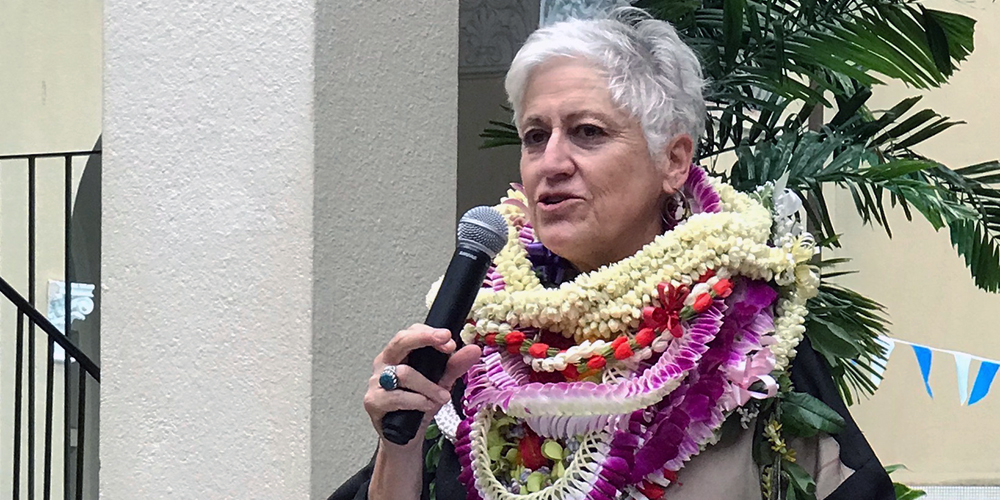
“Focus on the science,” says Drug Policy Forum Hawai‘i co-founder
When Hawai‘i became the first state to approve the use of medical marijuana through the state legislature, Pam Lichty felt particularly proud: she had written the first version of the legislation.
Pam, who graduated from the University of Hawai‘i at Mānoa with a Master of Public Health in 1987, had long wanted to work on the problem of substance misuse in the community. Research found that one of the best ways to help people with problematic drug use was to fight the widespread stigma attached to such use, but she felt discouraged by the predominant simplistic messages of the 1980s, which urged people to "just say no."
Her education at UH Mānoa showed her a different perspective. She learned about the "harm reduction" philosophy and strategies to combat problematic substance use, which resonated with her own values. Harm reduction involves being nonjudgmental, helping people to improve their health and that of their families and communities. It celebrates incremental change which may lead to abstinence or simply to less harmful methods of managing their drug use. "This approach just makes sense – it acknowledges the societal realities of drug use," Pam says.
In graduate school, Pam was deeply inspired by her classmates. "The UH Mānoa public health program is full of people with fascinating backgrounds in health, who bring different perspectives to your classes," she says. "People in public health want to serve their communities and address health disparities caused by socioeconomic factors, race, and income level."
Pam recalls a field placement at the Waikīkī Health Center, where she prepared a strategic plan for the facility, focusing on strengthening approaches to helping the community. This project gave her a great introduction to the key players in the health scene. She felt well-prepared to start working.
At her first job, as a clerk for the House health committee of the state legislature, she helped to write laws for improving community health. She worked to ban smoking in public places and protect the privacy and other rights of people living with HIV, which was a new and inevitably deadly disease at the time. "I am very proud of the role I played in such legislation – Hawai‘i led many other states on these issues," Pam says.
She went on to advocate for more changes in Hawai‘i laws. In 1993, she cofounded the nonprofit Drug Policy Forum of Hawai‘i, where she worked for 25 years. She advocated for starting the state's syringe exchange program (the first state-wide program in the nation) and educating policy makers and the general public about the roots of crystal methamphetamine abuse.
The legal changes Pam fought for always boiled down to focusing on the science. Research consistently finds, for example, that syringe exchange programs reduce rates of disease transmission and do not encourage drug use, and that prohibition-style policies vilifying drug users create a stigma disproportionally impacting poor communities and communities of color. She works hard to encourage a transition from a law enforcement approach for substance use problems to one grounded in the evidence-based principles of public health. This approach also reduces collateral damage to communities and individuals by incarceration, such as problems with housing, education, and child custody.
"Striving for equity brings marginalized populations into the light, and into care," Pam says. For her, a career in public health has meant improving people's quality of life by affecting their health behaviors and helping them to make healthy choices.
“Earning a degree in public health is an enriching experience,” she says. “The UH Mānoa program draws students from all over the Pacific Basin, and its graduates can influence health in the whole region. We can teach the world what public health can do."
